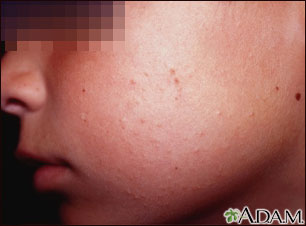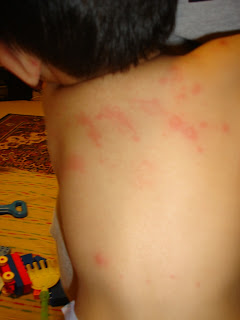The Importance of Medical Play
Last week, my 3 year old, whose asthma is generally very mild, needed a few treatments of his albuterol inhaler. Because he is unaccustomed to having the spacer device on his face, the process of administering the medication was a bit of an ordeal. When I say a bit of an ordeal, I mean kicking, screaming, tears flowing, hyperventilating -- you know, nothing I can't handle. I finally got the puffs in him, and swore to myself that we weren't going through that again. By that point, we were already late for daycare, so I left the inhaler and spacer on the coffee table and whisked the kids off to school.
 That evening, as I was preparing dinner, I heard a strange musical noise, and turned to find Son #2 using his spacer as a vuvuzela. Here was the same child who only that morning was so vehemently resisting his treatment, now dancing around the kitchen with his spacer and inhaler attached to his face.
That evening, as I was preparing dinner, I heard a strange musical noise, and turned to find Son #2 using his spacer as a vuvuzela. Here was the same child who only that morning was so vehemently resisting his treatment, now dancing around the kitchen with his spacer and inhaler attached to his face.The sound might have been as annoying as anything coming out of the World Cup stands, but it was music to my ears. Left to his own devices, my child overcame his fear of the unknown by doing what children naturally do -- playing. A second treatment later that evening went remarkably smoothly.
Medical play allows children to gain familiarity with diagnostic procedures in a non-threatening environment. This type of play is especially important for children who may be undergoing chronic treatment for conditions such as asthma, immune deficiency, or cancer. However, medical play can also assist in preparing children for one-time procedures or treatments, such as allergy skin testing or vaccinations. It doesn't require a great deal of specialized equipment- a simple store-bought toy doctor's kit and a stuffed animal are a great start.
There are also a variety of excellent books written for children who require a single routine doctor's visit or chronic medical care. A quick search online or at your library or local bookstore will yield a wealth of resources.
If your child has an upcoming physician's appointment or procedure scheduled, think about incorporating medical play before, during and after the visit. It just may make things easier for everyone. Just ask my spacer/vuvuzela-playing son, who is now breathing easy.




Comments
Post a Comment
Thanks for taking the time to comment on this blog's posts! Let's keep the discussion engaging and free of frivolous advertising or vulgarity. It's a family show, folks!